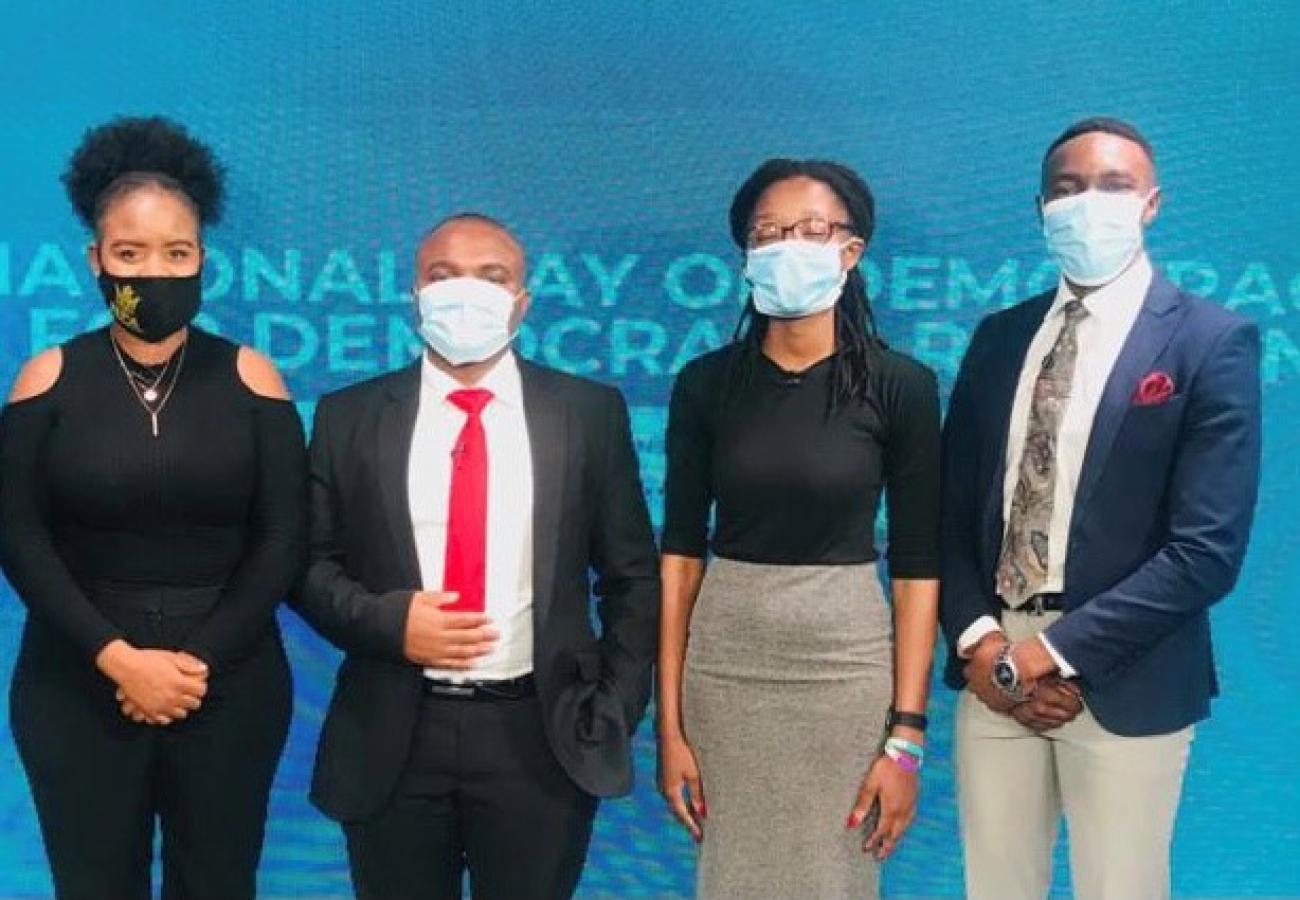Youth champions in the ‘drive for democracy’

Sustainable and inclusive development depends on the participation of the youth
24 September 2021, Harare - The Embassy of Sweden and UN in Zimbabwe jointly convened a series of advocacy initiatives on democracy providing youth with the platforms to advance democratic resilience in the context of the COVID-19 pandemic.
The joint advocacy that began on 15 September under the theme, youth for democratic resilience, marking the International Day of Democracy had facilitated a series of activities, including:
- opinion piece on youth participation and engagement in building democratic resilience,
- live studio-based conference where four young people read the bill of rights section of Zimbabwe’s Constitution and held discussion on how the rights to education, health, environment, food and water and many other fundamental rights can be fulfilled in Zimbabwe
- an open call to youth to submit a write-up on what democracy means to them received over 40 articles in which five top stories were selected and published.
Ms. Rumbidzai Trish Chitsa, 23, in a piece she submitted on what democracy means to her said, “Democracy is about the people, and about governance that responds to the desires of the people. I still believe that us young people have a shot at unleashing democracy and making it a reality for all.”
In Zimbabwe, more than 60% of the population is under the age of 35. The youth demographic dividend is an opportunity for innovation and change, a reminder to invest in young people and create an enabling environment so all young Zimbabweans have opportunities and reach their potential.
Sustainable and inclusive development depends on the participation of the youth. The 2030 Agenda for Sustainable Development overarching principle of “leave no one behind” is in sync with democratic principle of ensuring that all members of society - young people, men and women, people living with disabilities - are at the table of social, economic, and political dynamics.
During a live studio-based youth panel discussion, Mr. Makomborero Carl Muropa, 23, Head of Research and Evidence of Section7 said, “The events on democracy day gave me unique opportunity to give youthful perspectives on the notion of democracy in Zimbabwe, and how Section7 is contributing to its fulfilment.”
“Section7 acknowledges that young people can use the constitution for self-advancement and self-protection, in keeping with the spirit of democracy,” underlined Mr Muropa.
COVID-19 crisis has disproportionately affected children and young people: hampering educational opportunities as well opportunities for youth in terms of livelihoods, including those young entrepreneurs dependent on the informal economy.
UN Resident Coordinator, Ms. Maria Ribeiro in her video message on the day said, “Many young people have risen to the challenge caused by COVID-19 pandemic, showcasing innovative responses to the pandemic.”
Calling on policy and decision makers to seize the crisis caused by COVID-19 to invest in youth initiatives that foster employment, innovation, and climate smart action, Ms. Ribeiro said, “Young people are a powerful force for social transformation and development given the right kind of access to quality education, social services, and economic opportunities, that is, given the space to freely express their opinions and ideas.”
Democracy is about reducing inequalities and supporting democratic principles, its institutions, and actors. It is about strengthening everyone’s right to be who they are and making their voices heard.
In her video message to Zimbabwean youth, Her Excellency Åsa Pehrson, Swedish Ambassador to Zimbabwe said, “Democracy is a highly prioritized area for Sweden’s foreign policy and in 2019 my government launched a global campaign called “Drive for Democracy to promote and strengthen human rights, democracy, and the rule of law – in all societies at all levels.”
Noting Sweden’s history of supporting human rights and democracy in Zimbabwe before and since the country’s independence, Ambassador Pehrson said “We [Sweden] will continue our development cooperation with numerous local partners, in many cases with a special focus on young people, to improve different aspects of human rights and democracy.”
The International Day of Democracy aims to strengthen democracy by promoting equality, freedom, peace, human rights, inclusiveness, participation, and solidarity.
The UN Secretary General Mr. Antonio Guterres in his message on the day said, “Let us commit to safeguarding the principles of equality, participation, and solidarity, so that we can better weather the storm of [current] and future crises.”
In 2007, the UN General Assembly designated 15 September as the International Day of Democracy inviting all Member States, organizations of the UN system, regional and intergovernmental organizations, non-governmental organizations (NGOs) and individuals to commemorate the Day “in an appropriate manner that contributes to raising public awareness.”















